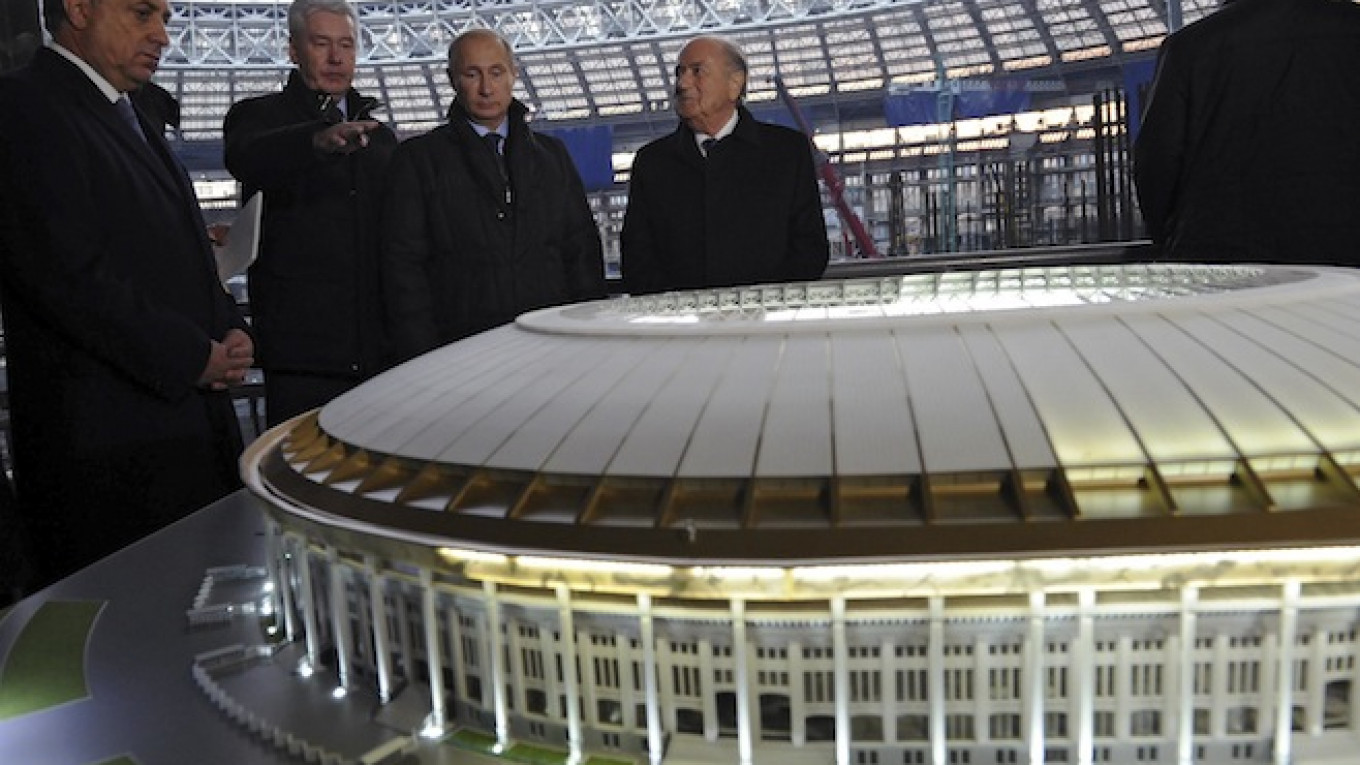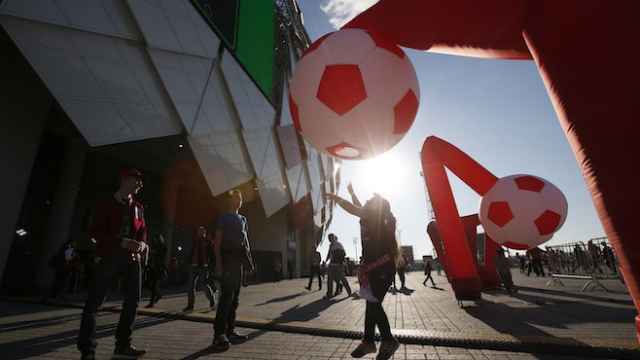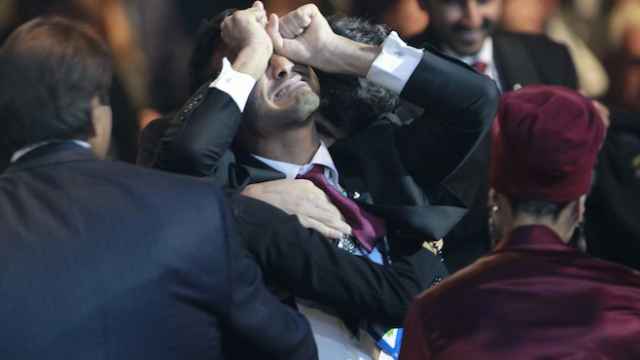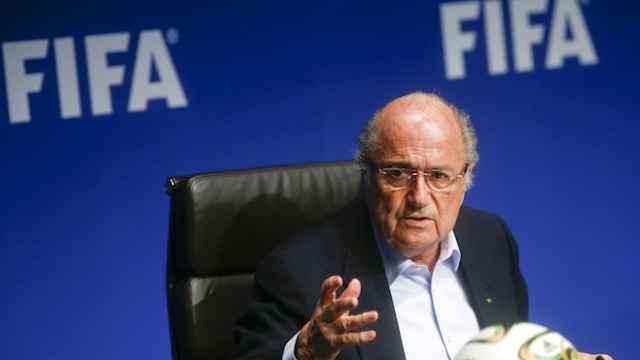The soccer World Cups of 2018 and 2022 are set go ahead in Russia and Qatar as planned after FIFA's ethics committee said Thursday it could find no grounds for reopening the controversial bidding process.
In a long-awaited report, the committee said that "the various incidents which might have occurred are not suited to compromise the integrity of the FIFA World Cup 2018/2022 bidding process as a whole."
The report criticized England's bid for the 2018 tournament for "inappropriate requests" from former CONCACAF president Jack Warner, a FIFA powerbroker at the time, in what it said was "an apparent violation of bidding rules."
It also said that in Australia's bid for 2022 "there are certain indications of potentially problematic conduct of specific individuals in the light of relevant FIFA Ethics rules."
"The occurrences at issue were...only of very limited scope," it added.
"In particular, the effects of these occurrences on the bidding process as a whole were far from reaching any threshold that would require returning to the bidding process, let alone reopening it — a decision which anyway would not fall under the FIFA Ethics Committee's competence.
"The assessment of the 2018/2022 FIFA World Cups bidding process is therefore closed for the FIFA Ethics Committee."
However, the report said ethics investigator Michael Garcia intended to open formal investigations against individuals, who were not named.
FIFA and Qatar World Cup organizers have been fending off allegations of corruption ever since the Gulf state was awarded the 2022 tournament.
Qatar, which has repeatedly denied the allegations, has also been criticized over its treatment of migrant workers in the construction industry.
The 2018 tournament was awarded to Russia as part of the same bidding process which culminated in December 2010.
Not Clear
In the case of Qatar, the report said "there are certain indications of potentially problematic conduct of specific individuals in the light of relevant FIFA Ethics rules" which did not compromise the bidding process.
It said that the relationship between former Asian Football Confederation president Mohamed Bin Hammam, banned for life by FIFA in 2011, and the Qatar bidding team was a "distant relative to the relationships of other FIFA Executive Committee members from bid nations."
The report said that it could not find any evidence of misconduct connected to the Russian bid, although it added that not all records had been available to the investigation.
"The Russia 2018 Bid Committee made only a limited amount of documents available for review, which was explained by the fact that the computers used at the time by the Russia Bid Committee had been leased and then returned to their owner after the Bidding Process. The owner has confirmed that the computers were destroyed in the meantime."
Much of the report was procedural and devoted to explaining the background to World Cup bidding processes and FIFA ethics guidelines.
Although it avoided naming individuals it said that two veteran FIFA executive committee members had resisted efforts to "hold them to the same rules as bid teams."
It also said that "two of the executive committee's most senior members challenged the Ethics Committee's independence and authority."
The report concluded that "the line between a bid team's conduct...and improper conduct is a very fine one. From which point on lobbyism must be considered as improper conduct is, for example, not always clear."
"The perception for example, according to which a FIFA World Cup vote must have been "bought" if the host selected is not the one that has been generally considered a favorite (a position that is quite common in the media,) is mere speculation and far from anything a judicial body like the FIFA Ethics Committee is allowed to accept as proof."
"By contrast, the...Ethics Committee is under the obligation to collect real facts, i.e. proof, which have then to be assessed by both Chambers of the Committee. In this regard, it shall be pointed out that such proof must be substantive, with (official) documents, money and paper trails, e-mail and other correspondence and witness statements still being the most sound kinds of proof."
The report added that "it must be made clear that [FIFA] President Blatter did not violate the FCE. The one concrete allegation against the President, concerning an account purportedly held in his name at a U.S. bank, was demonstrably false."
"Mr. Blatter has implemented a number of critical reforms, including those that made this inquiry possible."
"The bidding process established by FIFA was for the most part fair and thorough, although the Executive Committee's obligations in that process — including its members' obligations to abide the same reporting requirements placed on the bid teams — should have been made more explicit."
A Message from The Moscow Times:
Dear readers,
We are facing unprecedented challenges. Russia's Prosecutor General's Office has designated The Moscow Times as an "undesirable" organization, criminalizing our work and putting our staff at risk of prosecution. This follows our earlier unjust labeling as a "foreign agent."
These actions are direct attempts to silence independent journalism in Russia. The authorities claim our work "discredits the decisions of the Russian leadership." We see things differently: we strive to provide accurate, unbiased reporting on Russia.
We, the journalists of The Moscow Times, refuse to be silenced. But to continue our work, we need your help.
Your support, no matter how small, makes a world of difference. If you can, please support us monthly starting from just $2. It's quick to set up, and every contribution makes a significant impact.
By supporting The Moscow Times, you're defending open, independent journalism in the face of repression. Thank you for standing with us.
Remind me later.






